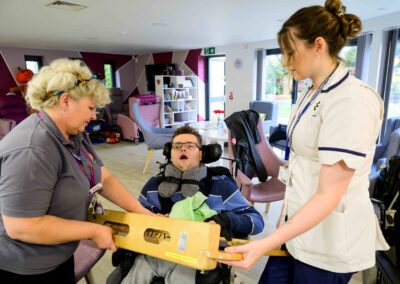St Elizabeth Hospice hosts new EPaCCS system
St Elizabeth Hospice is hosting a new system which will make care for those who are dying become much better co-ordinated across Suffolk.
A new electronic database, the Electronic Palliative Care Co-ordination System (EPaCCS), builds on the current programme which makes sure the wishes of patients reaching the end of their lives can be fulfilled. This wish could be simply being able to die in their place of choice such as their own home or care home.
People in the final year of their life often receive care from a variety of healthcare providers such as their GP, hospital, hospice, the out of hours and ambulance services. EPaCCS enables those healthcare organisations to access a patient’s record. It means care between different providers can be better co-ordinated as well as providing a place where the patient’s care preferences can be recorded and shared.
EPaCCS in Suffolk is being commissioned by the NHS Ipswich and East Suffolk Clinical Commissioning Group and NHS West Suffolk Clinical Commissioning Group, the clinically-led organisations responsible for buying-in and managing most local healthcare services. St Elizabeth Hospice in Ipswich plays a key role in this new service by hosting and administering EPaCCS for east and west Suffolk.
Jane Petit, Chief Executive of St Elizabeth Hospice, said: “We are really proud to be hosting this new system for the benefit of the people of Suffolk. Patients and their carers will no longer need to tell their story time and time again.
“Equally the professionals involved in a patient’s care will have the confidence that they have access to the latest information from everyone involved in that care. We feel this is a real step forward in supporting the people of Suffolk who are coming to the end of their lives to achieve the care that they want in the place that they want it to be.”
Dr Peter Holloway said: “Patients, their families and carers need as much support as we can give them, especially at the end of their lives.
“EPaCCS is based on Advance Care Planning, ensuring a patient’s wishes on what treatment they receive and where they are treated are recorded and accessible by the relevant healthcare providers. It will lessen the need for patients and carers to have potentially difficult conversations with unfamiliar clinicians, for example out-of-hours, since the clinician will be able to access EPaCCs and have a full understanding of the patients’ needs and wishes. EPaCCS will also help reduce the number of unnecessary and unwanted hospital admissions and treatments.”
Only patients who have given their consent for the recording and sharing of their information will be included in the EPaCCS programme.



